|
Britse schrijfster Charlotte Brontë werd geboren in Thornton op 21 april 1816. Zie ook alle tags voor Charlotte Brontë op dit blog.
Uit: The Correspondence of Charlotte Brontë
“Charlotte's reply to Robert Southey
16 March 1837
“SIR, I cannot rest till I have answered your letter, even though by addressing you a second' time I should appear a little intrusive ; but I must thank you for the kind and wise advice you have condescended to give me. I had not ventured to hope for such a reply ; so considerate in its tone, so noble in its spirit. I must suppress what I feel, or you will think me foolishly enthusiastic-
At the first perusal of your letter I felt only shame and regret that I had ever ventured to trouble you with my crude rhapsody ; I felt a painful heat rise to my face when I thought of the quires of paper I had covered with what once gave me so much delight, but which now was only a source of confusion ; but after I had thought a little, and read it again and again, the prospect seemed to clear. You do not forbid me to write ; you do not say that what I write is utterly destitute of merit. You only warn me against the folly of neglecting real duties for the sake of imaginative pleasures ; of writing for the love of fame ; for the selfish excitement of emulation. You kindly allow me to write poetry for its own sake, provided I leave undone nothing which I ought to do, in order to fureue that single, absorbing, exquisite gratification, I am afraid, sir, you think me very foolish. I know the first letter I wrote to you was all senseless trash from beginning to end ; but I am not altogether the idle dreaming being it would seem to denote. My father is a clergyman of limited though competent income, and I am the eldest of his children. He expended quite as much in my education as he could afford in justice to the rest. I thought it therefore my duty, when I left school, to become a governess. In that capacity I find enough to occupy my thoughts all day long, and my head and hands too, without having a moment's time for one dream of the imagination. In the evenings, I confess, I do think, but I never trouble any one else with my thoughts. I carefully avoid any appearance of pre- occupation and eccentricity, which might lead those I live amongst to suspect the nature of my pursuits. Following my father's advice who from my childhood has counselled me, just in the wise and friendly tone of your letter I have endeavoured not only attentively to observe all the duties a woman ought to fulfil, but to feel deeply interested in them. I don't always succeed, for sometimes when I'm teaching or sewing I would rather be reading or writing ; but I try to deny myself ; and my father's approbation amply rewarded me for the privation.
Once more allow me to thank you with sincere gratitude. I trust I shall never more feel ambitious to see my name in print ; if the wish should rise, I'll look at Southey's letter, and suppress it. It is honour enough for me that I have written to him, and received an answer. That letter is consecrated ; no one shall ever see it but papa and my brother and sisters. Again I thank you. This incident, I suppose, will be renewed no more ; if I live to be an old woman, I shall remember it thirty years hence as a bright dream. The signature which you suspected of being fictitious is my real name.
Again, therefore, I must sign myself C. BRONTE.”
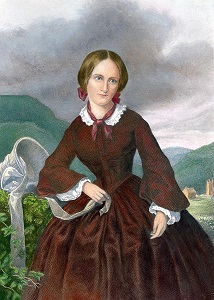
Charlotte Brontë (21 april 1816 – 31 maart 1855)
Op een Engelse poster
De Duitse literatuurwetenschapper en musicus Michael Mann werd als jongste kind van Thomas en Katia Mann geboren op 21 april 1919 in München. Zie ook alle tags voor Michael Mann op dit blog.
Uit: Achterbahn (door Frido Mann)
„So unberechenbar sich mein Vater als nervös überspannter Wüterich aufführen kann, so überraschend zugewandt, liebevoll und lebendig humorvoll kann er sein. Als einen der schönsten Augenblicke erinnere ich es, einmal auf seinen Schultern zu sitzen, während er von der Küche ins Esszimmer und wieder zurück geht und ich dabei aus dieser riesigen Höhe den abgründig tiefen Boden betrachten kann. Auch zu einem Kinderkonzert der San Francisco Symphony nimmt er mich manchmal mit, und ich darf von meinem Fauteuilsitz aus stolz seinem Bratschenspiel an einem der Pulte zuschauen, bis er mich wieder abholt. Eines Nachmittags darf ich mich in einem Fotostudio ablichten lassen (ein Foto, das noch bis vor Kurzem lose in meiner Fotosammlung herumlag) und mir anschließend ein wenig Marzipan aussuchen. Unvergesslich geblieben ist mir auch eine Nachtwanderung mit meinem Vater und Toni bei Vollmond durch den unheimlich dunklen Wald am Fuß des Mount Tamalpais über Mill Valley. Auf dem Heimweg verirren wir uns hoffnungslos. Mein Vater versteht uns jedoch zu beruhigen. Mit dem kleinen Toni auf seinen Schultern leitet er uns wohlbehalten zurück nach Hause. Gelegentlich nimmt er uns zum Krebsefangen am Waldbach neben der alten Mühle mit, die unserem Wohnort seinen Namen gegeben hat. Ein recht gruseliger Anblick ist es dann nur, wenn der Vater zu Hause vor unseren Augen die Tiere lebend in das kochende Wasser im Topf auf dem Herd wirft und dann begeistert den raschen Wechsel ihrer dunkelbraunen Farbe ins Rote kommentiert. Als er beim Krebsefangen einmal in den Bach stürzt, gibt er sein Missgeschick geistesgegenwärtig als eine Clown-Einlage für uns Kinder aus.“
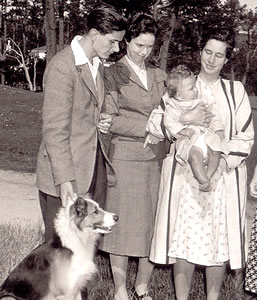
Michael Mann (21 april 1919 - 1 januari 1977)
V.l.n.r. Michael, Monika en Gret Mann, met de kleine Frido op de arm
De Franse schrijver Patrick Rambaud werd geboren op 21 april 1946 in Parijs. Zie ook alle tags voor Patrick Rambaud op dit blog.
Uit: The Battle (Vertaald door Will Hobson)
“In the morning of Tuesday 16 May 1809, a Berline flanked by horsemen pulled out of Schönbrunn and drove at a leisurely pace along the right bank of the Danube. It was an unremarkable carriage, olive coloured, without coats of arms on its panels. As it passed, the Austrian peasants raised their black, broad-brimmed hats, out of caution, rather than respect, because they recognized the officers riding their long-maned Arabs at a trot, a panther skin under their seats, uniforms in the Hungarian style — white, scarlet, heavy with gold — a heron's feather in their shakos: these young gentlemen were the permanent escort of Berthier, Major-General of the occupying army.
A man's arm appeared through the Berline's lowered window. The Grand Equerry Caulaincourt, who had been keeping his horse abreast of the carriage door, instantly squeezed his mount with his knees, removed his cocked hat and gloves with the dexterity of a circus rider, and unbuttoned his jacket to produce a folded map of Vienna's surroundings, which he held out with a salute. A moment later, the carriage came to a halt in front of the yellow, fast-flowing river.
A Mameluke in a turban jumped off the footman's box, unfolded the step, opened the door and prostrated himself in a flurry of exaggerated bows. The Emperor emerged, putting on his beaver-skin hat, its fur scorched by years of ironing. He had slung his frock coat of grey Louviers cloth like a cape over his grenadier's uniform. His breeches were ink-stained, since it was his habit to wipe quillpens on them and there had been an armful of decrees for him to sign before the day's parade. As ever, the Emperor wanted to decide everything himself, to settle in person every one of a thousand matters — from the distribution of new boots to the Guard to the supplying of Paris's fountains with water — matters which, more often than not, bore no relevance to the war he was now waging in Austria.
Napoleon was beginning to put on weight. His kerseymere waistcoat was stretched tight across a rounded stomach, he no longer had a neck and his shoulders sagged. His blank, indifferent expression only became passionate when he was angry. Today he was sullen, his mouth pinched. When he had heard for certain that Austria was arming herself against him, he returned from Valladolid to Saint-Cloud in five days, riding one horse after another into the ground. Having recently been sleeping ten hours a night and another two in his bath, thanks to the setbacks in Spain and now this further imbroglio, he had recovered all his strength in an instant.”
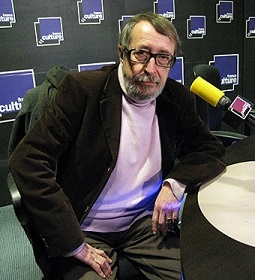
Patrick Rambaud (Parijs, 21 april 1946)
De Engelse schrijver John Mortimer werd geboren op 21 april 1923 in Londen. Zie ook alle tags voor John Mortimer op dit blog.
Uit: Rumpole and the Brave New World
"Their horizons seem to have become wide enough to include a quick dive for my wallet," I reminded her.
"It's a slow business Mr Rumpole, but we've got to keep trying."
I looked at her with admiration. No doubt it was an impossible task to persuade a bunch of adolescents that a choral work in a strange language was more interesting than picking the odd pocket. I felt a sudden affinity with Harriet. Both of us spent our lives trying to win impossible cases. My thoughts on this subject were interrupted by a twangy voiced, prematurely balding, eager man who had arrived in front of our table.
"Henry Dyson" - he announced his name as though confident I would know all about him - "of Dyson Furbelow, local solicitors. I'll be sending you a brief. I hope you may be able to fit us into your busy practice."
Flattery will get you anywhere, and I couldn't help warming to the strange solicitor.
"A murder perhaps?" I shouldn't have expected anything so sensational.
"I'm afraid not. I've got some important clients. You'll have heard of Lord Winsome, big house and estate up on the way to Kidlington? His boy, young Charlie, is being done for 'dangerous'. I told him you were the only man for the job. You are the only brief I have ever seen getting a client off a dangerous driving. You came down to the magistrates court here in Oxford. I was waiting to come on in the next case and I was astonished at the way you did it."
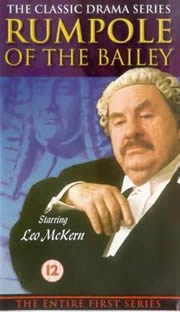
John Mortimer (21 april 1923 – 16 januari 2009)
De Duitse schrijver Peter Schneider werd geboren in Lübeck op 21 april 1940. Zie ook alle tags voor Peter Schneider op dit blog.
Uit: Die Lieben meiner Mutter
“Hin und wieder vermisste ich den Karton, weil ich ihn jahrelang nicht mehr gesehen hatte. Dann suchte ich ihn in einem Anfall undeutlicher Verlustangst und konnte ihn nicht finden. Wenn er beim nächsten Umzug wieder auftauchte, überkam mich eine Erleichterung, als hätte ich etwas für mich unendlich Wichtiges wieder entdeckt, und ich machte mich daran, den einen oder anderen Brief zu lesen. Aber es gelang mir nie, mehr als ein paar Halbsätze zu entziffern. Wie bei früheren Versuchen gab ich wieder auf – schwer zu sagen, ob es die Scheu vor den Mühen des Lesens war, die den Reflex des Aufschiebens hervorrief, oder die Furcht vor Entdeckungen, von denen ich lieber nichts wissen wollte. Mir gefiel das Motto, dem Bob Dylan gefolgt war: »Don’t look back!« Erfinde dich selbst, entferne dich von allen Bindungen, die du nicht selbst gewählt hast, besonders aber von dem Teil der Vergangenheit, den du nicht bestimmen konntest – von deiner Kindheit!
Eine alte Freundin, die von den Briefen wusste, hatte mir einen Rat gegeben, der mich beschäftigte: Am besten verfahre man mit den Briefen der Eltern, soweit sie nicht an einen selbst gerichtet seien, wenn man sie ungelesen in eine volle Badewanne werfe. Der Satz passte zu dem Misstrauen, das die »Generation der Nachgeborenen« gegen ihre Eltern entwickelt hatte, und er passte zu meinem Projekt der Selbsterfindung.
Gleichzeitig schien mir eine derartige Aktion zu dramatisch und nicht recht effizient zu sein. Wie verfährt man mit Briefen, deren Schrift sich nicht in Wasser auflöst, weil sie mit Bleistift geschrieben sind? Bleistift ist haltbarer als Tinte.“
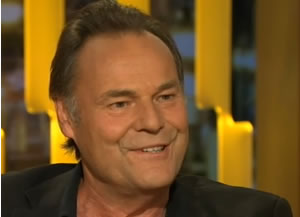
Peter Schneider (Lübeck, 21 april 1940)
Onafhankelijk van geboortedagen:
De Duitse dichter Gerrit Wustmann werd in 1982 in Keulen geboren. Zie ook alle tags voor Gerrit Wustmann op dit blog.
galata kulesi unten
nacht die akkorde der sitar
und die klage der saz des mannes
der immer hier sitzt die klage
der bäume und die violinen
die aus fenstern klingen
morgens um zwei stimmt
der gitarrenbauer ein letztes
instrument bevor er die letzten
katzen füttert ein letzter çay
ein letzter noch zuletzt dieser
blick dieses lachen und
die nachtlichter der schiffe
auf dem bosporus
sis
im nebel verschwindet die stadt
schläft im regen unter der brücke
ragen die türme aus dem nichts
vor haydarpasa tauchen geister
möwen auf und ziehen kreise
um kadiköy und das knirschen
am anleger das knirschen einer
leisen berührung die delphine
tauchen heute
nicht auf
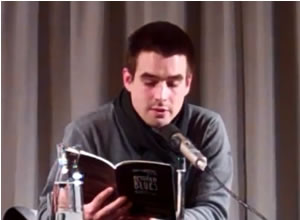
Gerrit Wustmann (Keulen, 1982)
Zie voor nog meer schrijvers van de 21e april ook mijn blog van 21 april 2014 deel 2.
|



